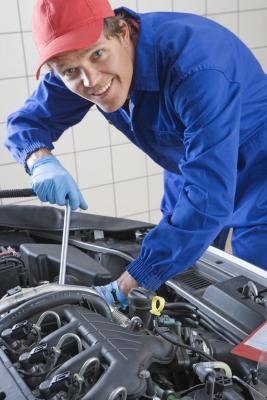Monday, March 31, 2014
Can a Failing Fuel Pump Cause a Vapor Lock

Several things can cause a fuel pump to begin to fail, such as electrical problems which can prevent an adequate amount of voltage from flowing through the circuit that supplies power to the fuel pump. The failing fuel pump can then cause other problems that vehicle owners should be aware of.
Vapor Lock
Residual fuel pressure should remain in a vehicles fuel system even if a fuel pump has quit running. However, a leaky fuel pump can allow the system to lose pressure rapidly. In hot temperatures, a vehicle can experience vapor lock if residual fuel pressure gets too low.
Pressure
After checking a fuel pumps pressure specifications, a test can then be performed to compare that with the current pressure being produced by the pump. A pressure reading that isnt high enough often indicates a weak and failing fuel pump.
Tests
There are several types of test that can be performed on a fuel pump to see if its failing, such as a dead pressure test which reveals the total output pressure of the fuel pump. Another test is called a fuel volume test which is helpful in making sure the fuel pump is supplying enough fuel to meet the engines needs.
Wednesday, January 22, 2014
Would Excessive Transmission Fluid Cause Slipping

Transmission fluid provides the necessary lubrication a vehicles transmission needs to function properly. The performance of an automobiles transmission is directly affected by transmission fluid levels.
Too Much
An excessive amount of transmission fluid can negatively affect a transmission. When fluid levels are too great, it can result in air mixing in with the transmission fluid. This can cause slipping in a transmission as well as other gear-shifting issues.
Too Little
When transmission fluid levels are too low, this can also be damaging to a transmission. It can slip or be slow to engage when not enough fluid has been added. Keep the fluid levels between the Full and Add section of your transmissions dipstick.
Check Levels
Because a transmission should be hot when performing fluid level checks, a vehicle should be put in park and left idling during this process. If everything is fine, you wont get a low-level fluid reading because transmissions dont consume fluid during operation. A low level reading often indicates a leak.
Tuesday, October 15, 2013
What Could Cause a Backfire Through the Intake

Every engine component plays a key role in your cars function, and the intake system is no exception. If the intake backfires, this is an issue that must be addressed immediately. However, diagnosing and fixing this problem requires some knowledge of the system. Understanding the intake system and the causes of backfiring will help you confirm or rule out this issue.
Intake Manifold
It is necessary to understand the intake system in order to see how backfiring occurs. The intake valve is a component of the intake manifold. The manifold is located on the top of V6 and V8 engines. For inline four- or six-cylinder engines, the intake manifold is installed on the side. The manifolds job is to provide a mixture of air and fuel to the engines cylinders. To do this, the intake valve opens to draw gas and air into the engine. After opening, the valve closes to keep this air and fuel combination trapped inside.
Cause of Backfiring
Backfiring is a small explosion. Although there are many problems that can cause the intake system to backfire, the overall effect is the same. Since the intake valve needs to provide the engine with a proper balance of fuel and air, a backfire occurs when that balance fails. In this case, having less fuel than air in the mixture will cause the small explosion. Luckily, this does not result in serious damage.
Main Cause
Engines are full of components, many of which can malfunction to trigger a backfire. The most common reason for this is a faulty fuel system. The fuel system consists of three components: the vacuum, the airflow sensor and the oxygen sensor. All of these parts are responsible for maintaining the air-to-fuel balance in your engine. If any of the parts are damaged or defective, backfires can occur.
Other Causes
A leak in the air injection system can also cause the intake to backfire, since this affects the amount of air taken in. Another possible reason is a malfunctioning fuel pump or obstructed air filter. The intake system must be timed correctly so that it can feed fuel and air to the spark plugs at a proper rate. If this timing is off, it can be another cause for backfiring.